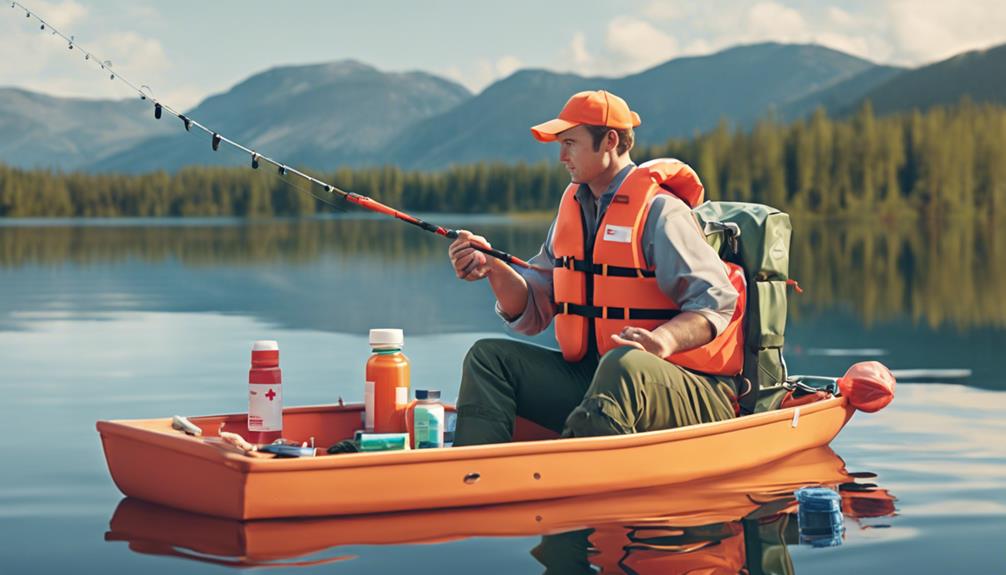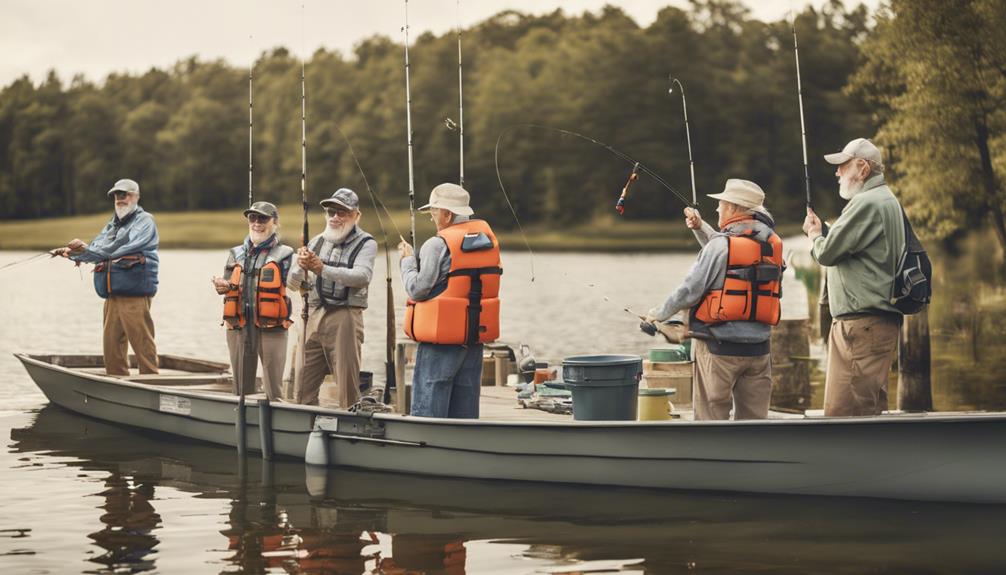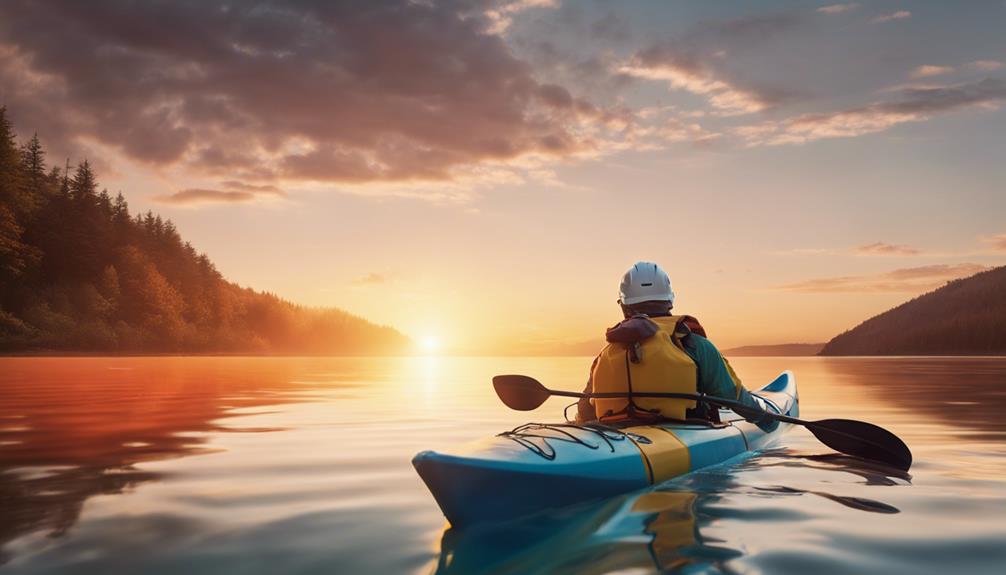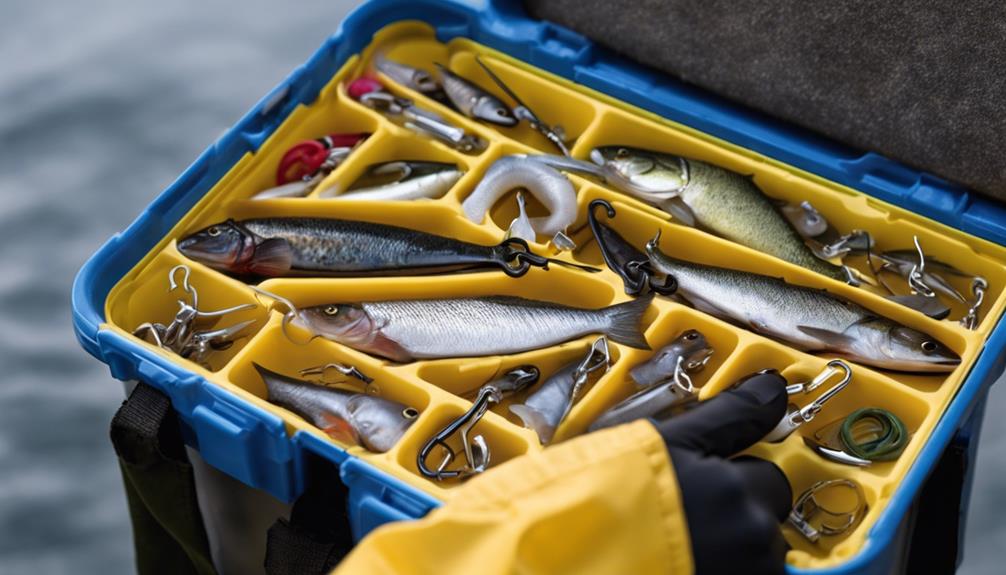When it comes to freshwater angling, safety should be your compass, guiding you through the waters like a steady hand on a rudder. Ensuring a successful and secure fishing experience requires attention to detail, from the gear you use to the environment you navigate.
But what are the top 5 safety precautions that every angler should prioritize? Let's explore these essential measures that can make a significant difference between a memorable fishing outing and a potential emergency situation.
Proper Gear and Equipment
When heading out for freshwater angling, ensure you have the proper gear and equipment to enhance your fishing experience. Proper gear maintenance is essential for a successful fishing trip. Before each outing, check your equipment for any signs of wear and tear. Inspect your fishing rod for any damage, such as cracks or loose guides, and make sure the reel is functioning smoothly. Clean your gear after each use to prevent rust and corrosion, especially if you fish in saltwater or muddy conditions.
Equipment selection plays a crucial role in freshwater angling. Choose the right gear based on the type of fish you're targeting and the fishing location. Different fish species require different bait and lures, so make sure you have a variety of options in your tackle box. Consider the water depth and clarity when selecting the appropriate fishing line and weight. A good pair of polarized sunglasses can also help you see fish and underwater structures more clearly, improving your chances of a successful catch.
Weather Monitoring
Monitoring the weather is crucial for freshwater angling success. Storm tracking is essential to ensure you aren't caught in dangerous weather conditions while out on the water. Always check the weather forecast before heading out and keep an eye on any sudden changes in the sky. Safety should be your top priority when it comes to weather conditions.
Temperature monitoring is also important for your safety and the success of your angling trip. Extreme temperatures can pose risks to your health, so take precautions accordingly. In hot weather, make sure to stay hydrated and protect yourself from the sun by wearing sunscreen and a hat. In cold weather, dress warmly in layers to avoid hypothermia.
When storm tracking, be prepared to seek shelter if needed. It's crucial to have a plan in place in case of sudden storms. Remember, it's better to be safe than sorry when it comes to inclement weather. By staying vigilant and monitoring the weather conditions closely, you can enjoy a safer and more successful freshwater angling experience.
Water Safety Knowledge
To ensure your safety while freshwater angling, understanding water safety knowledge is paramount. Boat safety is crucial when venturing out onto the water. Always ensure that your boat is equipped with life jackets for each passenger, a first aid kit, and emergency supplies. Be familiar with how to operate the boat safely, including basic navigation rules and what to do in case of emergencies such as capsizing.
Swim skills are equally important, even if you don't plan on swimming during your fishing trip. Knowing how to swim can be a lifesaver in unexpected situations. Take the time to improve your swimming abilities and consider taking a formal swimming lesson if needed. Additionally, understanding water currents and how they can affect your surroundings is essential for staying safe while angling.
Before heading out, familiarize yourself with the water body you'll be fishing in. Know the depth of the water, potential hazards, and any specific rules or regulations that apply. Being informed can prevent accidents and ensure a more enjoyable fishing experience. By prioritizing boat safety and swim skills, you can enhance your overall water safety knowledge and minimize risks while freshwater angling.
Sun Protection Measures
Wondering how you can safeguard yourself from the sun's rays while freshwater angling? Sun protection is crucial to ensure a safe and enjoyable fishing experience. Start by applying sunscreen generously before heading out to the water. Choose a water-resistant formula with a high SPF to protect your skin from harmful UV rays. Remember to reapply sunscreen every few hours, especially if you're sweating or getting wet.
Wearing a hat while fishing is another essential sun protection measure. Opt for a wide-brimmed hat to shield your face, ears, and neck from direct sunlight. This simple accessory can provide significant protection and help prevent sunburns. Additionally, seek shade whenever possible during your angling trip. Whether it's under a tree, a canopy, or an umbrella, taking breaks in the shade can give your skin a much-needed break from constant sun exposure.
In the heat of the day, make sure to stay hydrated. Bring an ample supply of water to prevent dehydration, especially when spending long hours in the sun. Proper hydration not only keeps you comfortable but also supports your overall well-being while fishing. By following these sun protection measures – sunscreen application, hat wearing, shade seeking, and hydration maintenance – you can enjoy a safer and more enjoyable freshwater angling experience.
First Aid Preparedness
For optimal safety during freshwater angling, ensure you have a well-equipped first aid kit readily accessible at all times. Accidents can happen unexpectedly, and being prepared with the right supplies and knowledge can make a significant difference in handling emergencies effectively.
Here are three essential items to include in your first aid kit:
- First Aid Training: Prioritize taking a first aid training course to equip yourself with the necessary skills to handle common injuries that may occur during angling trips. Knowing how to administer CPR, treat cuts, burns, or insect bites can be invaluable in emergency situations.
- Emergency Supplies: Stock your first aid kit with essential emergency supplies such as adhesive bandages, antiseptic wipes, gauze pads, medical tape, scissors, and tweezers. These items will help you address minor injuries promptly before seeking further medical assistance.
- Communication Device: In addition to physical supplies, carry a fully charged cell phone or a two-way radio to call for help in case of a severe emergency. Ensure your device has good network coverage in the area where you plan to fish.
Wildlife Awareness
Ensure you maintain a keen awareness of the wildlife around you while freshwater angling to prevent unexpected encounters or disturbances. Understanding animal behavior is crucial to staying safe. Some species, like snakes or bears, may pose a threat if startled. Be mindful of your surroundings and avoid sudden movements that could startle nearby wildlife. Additionally, respecting their habitat is essential for both your safety and the conservation of the ecosystem. By not disturbing their natural environment, you can help maintain a balanced ecosystem for future angling trips.
When angling, be cautious near bodies of water where animals may come to drink or hunt. Avoid blocking their paths to avoid confrontations. Furthermore, be mindful of nesting areas along the shoreline, as disturbing these spaces can agitate wildlife. By staying alert and keeping a safe distance, you can observe animals without causing harm.
Habitat conservation is key to preserving the diverse wildlife that inhabits freshwater environments. Avoid leaving behind any trash or fishing equipment that could harm animals. Practice catch and release techniques responsibly to ensure the well-being of the fish population. By being a responsible angler and respecting the wildlife around you, you contribute to the sustainability of the ecosystem for future generations to enjoy.
Fishing Buddy System
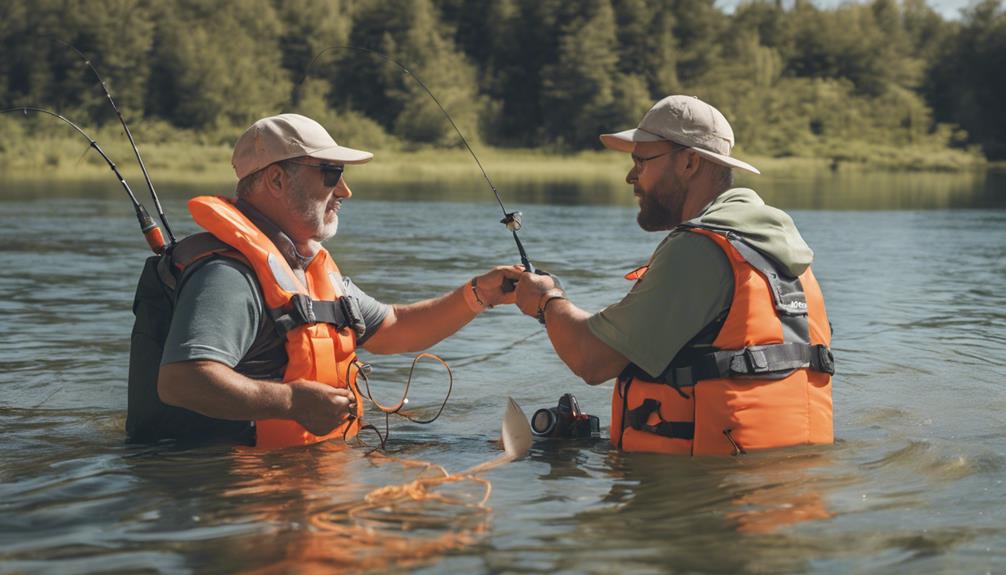
Consider partnering up with a fishing buddy to enhance safety and enjoyment during your freshwater angling adventures. Having a companion with you while fishing can provide an extra layer of security and make the experience more enjoyable. Here's how a fishing buddy system can help you stay safe and prepared:
- Increased Safety Protocols: When you fish with a buddy, you have an extra set of eyes and hands to help you navigate any potential dangers. Your fishing buddy can assist in watching out for hazards, handling equipment, and reacting to unexpected situations swiftly.
- Emergency Response: In case of an emergency, having a fishing buddy can be a lifesaver. Whether someone gets injured, equipment malfunctions, or weather conditions worsen, having a partner there means you can quickly call for help, administer first aid if needed, or assist each other in getting to safety.
- Shared Knowledge and Experience: Fishing with a buddy allows you to share tips, tricks, and techniques. This exchange of knowledge can enhance your fishing skills, increase your chances of success, and make the overall fishing experience more fulfilling. Plus, it's always more fun to celebrate a catch or strategize together.
Emergency Action Plan
Having a well-prepared emergency action plan is crucial for ensuring your safety during freshwater angling excursions. When creating your emergency response strategy, consider factors like communication protocols. In case of an emergency, the first step is to stay calm and assess the situation. If someone is injured or in danger, your emergency response plan should include clear steps on how to seek help promptly.
Establish communication protocols with your fishing buddies before heading out. Ensure everyone knows how to contact emergency services and has a list of important numbers readily available. Designate a meeting point in case you get separated and agree on a distress signal to alert others if help is needed.
Practice your emergency action plan before you hit the water. Simulate scenarios like a capsized boat or a medical emergency to ensure everyone knows their roles. Knowing what to do in advance can make a significant difference in the outcome of a real emergency situation.
Frequently Asked Questions
What Is the Best Way to Handle a Fish Hook Injury While Fishing?
If you get a fish hook injury while fishing, it's crucial to act swiftly and responsibly.
First aid for a hook injury involves assessing the situation and deciding on the best removal method. To remove the hook, it's recommended to push it through and cut the barb.
Remember to keep the wound clean and seek medical help if needed. Safety precautions like these can prevent further complications and ensure a smooth fishing experience.
How Can I Avoid Getting Tangled in Fishing Line While Casting?
To avoid getting tangled in fishing line while casting, focus on line management and proper casting techniques. Make sure your gear is well-maintained to prevent snags.
Before casting, check for any tangles or knots in the line. Practice smooth casting motions to prevent backlash.
Are There Any Specific Dangers to Be Aware of When Fishing in Murky or Fast-Moving Water?
When fishing in murky or fast-moving water, keep an eye out for potential risks. Poor water visibility can make it harder to see obstacles or changes in depth.
Ensure you have the right safety equipment, like life jackets, in case of emergencies. Be cautious of the current strength and always have emergency procedures in mind.
Stay alert and prepared to handle any unexpected situations that may arise in these challenging fishing conditions.
What Precautions Should Be Taken When Fishing in Areas Known for High Levels of Bacteria or Pollution?
When fishing in areas with poor water quality due to high levels of bacteria or pollution, it's crucial to take precautions.
Always wash your hands thoroughly after handling fish or gear, and avoid consuming fish from contaminated waters.
Additionally, wear protective gear like gloves and boots to minimize contact with polluted water.
Following these safety measures can help reduce the risks associated with fishing in areas known for compromised water quality.
How Can I Effectively Communicate With Emergency Services if an Accident Occurs While Fishing in a Remote Location?
In a remote location while fishing, communicating with emergency services is crucial. Ensure your phone has signal or pack a satellite phone for emergencies.
Learn emergency signal techniques like using a whistle or signal mirror. Take a wilderness first aid course to handle injuries until help arrives.
Always share your location with someone trustworthy before heading out. Stay prepared with basic survival gear like a first aid kit and emergency blanket.
Conclusion
So, remember to always prioritize safety when heading out for a day of freshwater angling.
By following these top 5 safety precautions, you can ensure a fun and safe fishing experience:
- Having the right gear
- Keeping an eye on the weather
- Knowing water safety
- Protecting yourself from the sun
- Being prepared with first aid
Stay aware of your surroundings, plan ahead with a fishing buddy, and have an emergency action plan in place for any unexpected situations.
Happy fishing!
